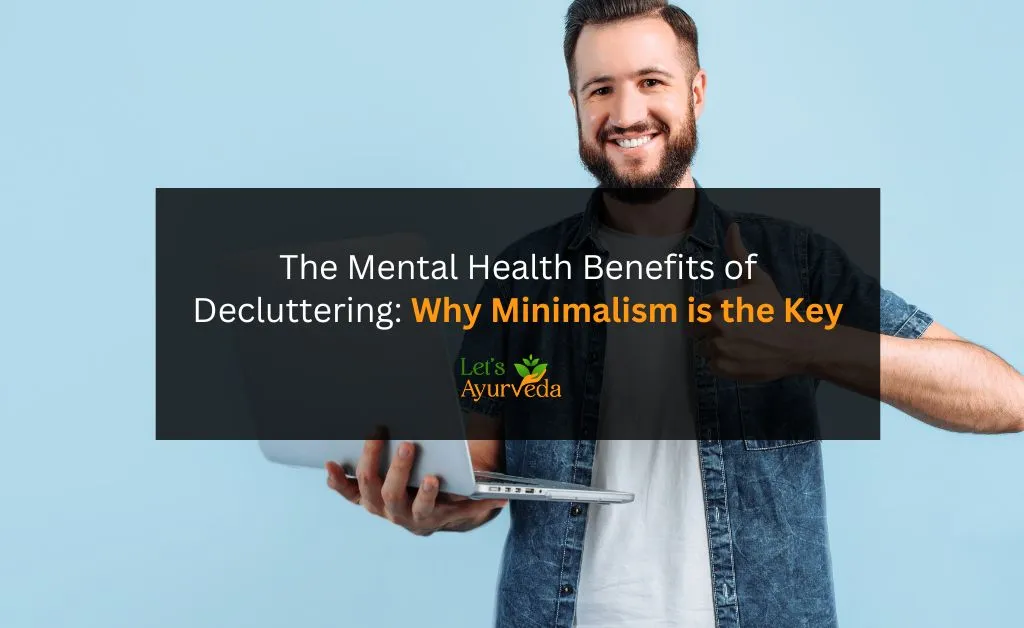In a world that constantly demands more from us, it’s easy to feel overwhelmed. The chaos of a cluttered space often mirrors the chaos in our minds. But what if we told you that simplifying your environment could have a profound effect on your mental well-being? That’s right—decluttering doesn’t just help tidy up your home; it can help clear your mind too.
In this blog, we’ll dive into the power of minimalism and explore how decluttering can actually improve your mental health. From reducing stress to boosting creativity, we’ve got seven game-changing benefits of decluttering that you won’t want to miss!
What is Minimalism?
Minimalism, at its core, is the practice of intentionally reducing physical and mental clutter to focus on what truly adds value to your life. It's about simplifying your environment, your commitments, and your thoughts so you can prioritize things that genuinely matter.
Many people associate minimalism with owning fewer items or having a clean, sparse home, but it’s much more than that. It’s a mindset that can extend to various areas of life, from your physical space to your relationships, work habits, and even your mental space.
The Link Between Clutter and Mental Health
Clutter isn’t just an eyesore—it can also take a serious toll on your mental well-being. According to a study by the University of California, clutter in the home or workspace can cause increased stress, anxiety, and depression. In fact, 77% of people report feeling anxious and stressed when their surroundings are disorganized. This happens because clutter can act as a constant visual reminder of tasks that need to be completed or problems that need to be solved, creating mental fatigue and frustration.
In addition to this, clutter can lead to a phenomenon known as "decision fatigue," where the brain becomes overwhelmed by the constant need to make small decisions—like choosing what to wear or where to find something. Over time, this can leave you feeling mentally exhausted and less able to tackle larger tasks.
How Decluttering Improves Mental Health
Now, let’s explore the science behind why decluttering works wonders for mental health.
1. Reduces Stress and Anxiety
Decluttering your environment can instantly create a sense of calm. When your surroundings are clean and organized, it’s easier to relax and focus. A study conducted by Princeton University Neuroscience Institute found that physical clutter can make it harder for your brain to process information, leading to higher stress levels.
In contrast, a clean space promotes a more focused and relaxed mind. A minimalist environment can reduce the stress of constant visual reminders and provide a mental break, helping you to feel more in control of your life.
2. Boosts Productivity
Did you know that clutter can slow you down? When your workspace is filled with unnecessary items, it takes longer to find what you need, leading to wasted time and energy. On the flip side, minimalism encourages streamlined, efficient environments that help you stay organized and productive.
Studies show that people who work in a clean, organized environment are more focused and productive. The increased productivity not only helps in completing tasks faster but also boosts feelings of accomplishment and satisfaction, which are essential for mental well-being.
3. Improves Mental Clarity
Decluttering helps clear the mind by removing distractions. When you reduce the amount of physical clutter, you allow yourself more mental space to focus on what's important. This mental clarity can enhance your ability to think creatively, solve problems, and make decisions.
The fewer distractions you have, the better you can focus on your goals and desires. Minimalism allows your brain to focus on what truly matters, whether that’s personal growth, relationships, or achieving success in your career.
4. Increases Happiness and Contentment
When you’re surrounded by things you love and need, you naturally feel more content. Minimalism encourages you to eliminate the things that don’t serve a purpose in your life. This intentional focus on the essential helps foster a sense of satisfaction and fulfillment.
By letting go of material possessions that don’t align with your values, you can make room for the things that truly bring joy and happiness into your life. The result? Increased overall well-being and a deeper sense of gratitude.
4. How to Start Decluttering Your Life
Now that we’ve established the mental health benefits of minimalism, let’s explore how you can start decluttering today. Here are actionable steps to help you transform your environment and mindset:
1. Start Small
Don’t overwhelm yourself by trying to declutter everything at once. Begin with small, manageable spaces—like a drawer, a shelf, or your desk. Set a timer for 15-20 minutes and focus on clearing out unnecessary items. As you make progress, you’ll feel motivated to tackle larger areas.
2. Evaluate Each Item’s Value
Ask yourself: Does this item add value to my life? If it doesn’t serve a functional purpose or bring you joy, it might be time to let it go. Be honest with yourself about what you truly need.
3. Create Designated Spaces
One key principle of minimalism is creating specific places for your items. This helps prevent clutter from building up over time. Use baskets, bins, and storage solutions to keep things organized and easily accessible.
4. Declutter Your Mind
In addition to physical clutter, mental clutter can also impact your mental health. Start practicing mindfulness or journaling to clear your mind. Meditation is another great way to reduce stress and improve clarity. These practices help you focus on the present moment and avoid getting lost in unnecessary thoughts.
5. Commit to Regular Decluttering
Minimalism isn’t a one-time fix; it’s a lifestyle change. Make decluttering a regular part of your routine. Set aside time each week or month to reassess your environment and get rid of anything that no longer serves you.
5. The Emotional Benefits of Minimalism
Beyond the immediate mental health benefits, minimalism offers emotional perks as well. By living a more intentional life, you free yourself from the pressures of consumerism and the constant need to accumulate more. This shift can reduce feelings of inadequacy, jealousy, and the fear of missing out (FOMO), leading to improved emotional well-being.
Additionally, minimalism fosters a deeper connection with yourself. By focusing on the essentials, you become more attuned to your true desires, values, and needs. This emotional clarity can lead to greater self-acceptance and contentment, which are key components of good mental health.
6. A Call to Action: Start Your Minimalism Journey Today
Ready to experience the life-changing benefits of minimalism for yourself? It’s time to take action. Decluttering doesn’t have to be a daunting task—it’s about making small, manageable changes that add up over time. The more you clear out, the more space you create for peace, joy, and clarity.
Remember, minimalism isn’t about depriving yourself; it’s about choosing to surround yourself with what truly brings value and happiness. By decluttering your space, you’ll declutter your mind and transform your mental health in ways you never thought possible.
Start today and feel the weight lift off your shoulders as you make room for the life you truly want to live.
Conclusion: Embrace Minimalism for Better Mental Health
The benefits of decluttering go far beyond just a neat and tidy space. Minimalism can transform your mental health, boosting your happiness, reducing stress, and helping you live a more purposeful life. By removing distractions and focusing on what truly matters, you open the door to a healthier, more fulfilling lifestyle.
So, what are you waiting for? Take that first step towards a clearer mind and a more peaceful life by embracing the power of minimalism today!






